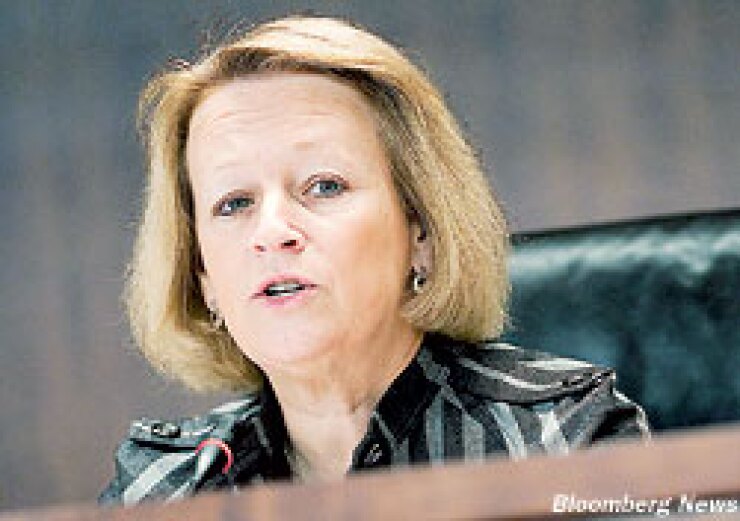
WASHINGTON — The Securities and Exchange Commission will likely vote to adopt final changes to its Rule 15c2-12 on disclosure “very early” next year and will then meet with lawmakers to see what can be done to expand its authority over the muni market, SEC chairman Mary Schapiro said this week.
“We’re coming close to having exhausted the limits of our authority to mandate disclosure through the dealers,” she said in an interview with The Bond Buyer from her 10th floor office overlooking the U.S. Capitol here. “And it will be time for us next year to take a serious look at what more we can do and what we ought to be talking to Congress about doing.”
Schapiro — who is in her 10th month as head of an agency that has engaged in 10 major rulemakings in as many months, a number of significant enforcement cases, and some major restructuring — would not commit to any specific legislative changes she would like to see with regard to the SEC’s authority over munis.
“Look, my goal is, to the greatest extent possible and understanding that the markets are different, that we level the playing field on disclosure between corporates and municipals,” she said. “What that means specifically in terms of what legislative language looks like — we’re still thinking about that and discussing that.”
Though the commission itself has not taken a position on the repeal of the so-called Tower Amendment, Schapiro said, “It’s time for us [to focus on that] next year when we get through this big rulemaking push.”
Added in 1975 to the Securities and Exchange Act of 1934, Tower prohibits the SEC and the Municipal Securities Rulemaking Board from collecting disclosure documents prior to a bond sale.
Several SEC commissioners have said it and other exemptions for munis in the securities laws should be repealed to boost muni disclosure standards.
Schapiro’s remarks come two weeks after SEC commissioner Elisse Walter gave a strong speech on municipal securities that called for the repeal of Tower and other muni exemptions.
Walter also urged lawmakers to give the SEC regulatory authority over all financial intermediaries in the municipal market and to “seriously consider” combining muni market rulemaking and enforcement authority into one self-regulatory organization.
While Schapiro said that she does not agree with every word Walter said, she praised her speech as “very, very strong” and “an excellent dissertation,” adding: “I certainly agree with the sentiment that we need to come closer to leveling the playing field between corporate disclosure and municipal disclosure.”
Asked if the SEC will seek broad market support for new authority, Schapiro said that the commission will try to reach consensus where it can, “but if we can’t then we’ll have to figure out what’s the right thing to do.”
“Clearly there are costs and burdens to disclosure, but these are incredibly important markets and they’re incredibly important to retail investors,” she said.
Turning to enforcement, Schapiro said it is “disheartening” to hear about alleged firms engaging in anticompetitive practices with regard to municipal investment contracts and derivatives.
A federal grand jury last month indicted CDR Financial Products Inc., its founder David Rubin, and two of his colleagues, charging they were part of a widespread conspiracy to rig bids for contracts in return for kickbacks disguised as fees. The SEC has been conducting a civil probe in parallel with the Justice Department’s criminal one.
Schapiro declined to comment on the investigations, but a knowledgeable source said this week that the commission is “deeply involved” in the probe.
The SEC last week announced that it had settled securities fraud and other charges against JPMorgan and is pursuing charges against two of the firm’s former managing directors in connection with muni bond and swap transactions done with Jefferson County, Ala.
The suit against the two former bankers — Charles LeCroy and Douglas MacFaddin — alleges they made more than $8 million in undisclosed payments to close friends of certain Jefferson County commissioners and broker-dealers, including Goldman, Sachs & Co., to ensure that JPMorgan would be selected as managing underwriter of the bond offerings and that its affiliated bank would be chosen as the provider of swaps.
“It’s upsetting, frankly,” Schapiro said. “To see these kinds of problems that have the potential to adversely impact both the investors and the issuers really compels us to have this kind of enforcement focus as well as the disclosure focus to the maximum extent we can. This market is so critically important to local governments and so critical to funding the infrastructure of this country.”
“When it’s a municipal issuer that’s funding a hospital or a school district or a sewer system and the business wasn’t legitimately earned by the broker or the adviser, that’s hugely disheartening on both sides of the equation,” she said, referring to issuers and investors.
While the SEC has not brought nearly the number of muni bond-related enforcement cases as when Arthur Levitt headed the commission a decade ago, Schapiro said that muni enforcement is a priority “and one reason you can make that assumption is that it is one of the specialized areas in the enforcement restructuring.”
The commission announced this summer that it is creating five national units to specialize in complex areas of securities law, one of which will focus on municipal securities and pension funds.
The SEC staff is interviewing candidates to head the group. Currently, the agency coordinates its municipal securities enforcement activities through a group led by officials in its Philadelphia office, including regional muni securities counsel Mark Zehner.
Asked where the muni and pension unit would be based, Schapiro said it will depend on the location of the enforcement official hired to run it but that it will draw staff from SEC offices nationwide.
One of Schapiro’s major efforts is to push for increased resources for the commission and she does not rule out hiring more staff for municipal securities.
The commission’s municipal unit currently has only two full time attorneys: Martha Mahan Haines, who runs the office housed in the division of trading and markets, and Mary Simpkins, a senior special counsel.
The SEC announced this week that it has tapped Robert Cook to become the new director of the division. Once Cook, who is currently a partner at Cleary Gottlieb Steen & Hamilton LLP, is on board, he will evaluate where there are shortfalls in resources and personnel, she said.
“We have real resource needs,” Schapiro said, noting that the agency is smaller than it was in 2005 but does not have the budget flexibility to gear up immediately to address a range of issues.
Under legislation introduced this week by Senate Banking Committee chairman Christopher Dodd, D-Conn., the SEC would be able to fund itself from fees levied on the firms it regulates. The SEC is expected to collect $1.5 billion in registration and transaction fees this year.
President Obama requested $1.026 billion for the SEC for fiscal 2010, which started in October. A bill pending in the House has proposed $1.036 billion for the SEC, while one in the Senate would provide $1.136 billion.
Despite the existing funding constraints, Schapiro said that Haines “does a really first-class job” and that she and Simpkins “have really pushed the limits of creativity in terms of [our] existing authority” with regard to muni disclosure.
The SEC in July proposed changes to its Rule 15c2-12 that would expand the quality and timeliness of secondary market disclosures.
Under the proposal, dealers would be unable to underwrite bond deals unless the issuer contractually agrees to disclose seven of the 11 events currently listed in the rule regardless of whether they are material.
In addition, four new events would have to be disclosed, two of them without regard to materiality.
The commission is still weighing that proposal, along with a related MSRB plan to specially designate issuers on the Electronic Municipal Market Access system that voluntarily agree to any of four undertakings.
They include the submission of annual financial information within 120 days of the end of their fiscal years and adherence to generally accepted governmental accounting standards established by the Governmental Accounting Standards Board.
Though the commission received strong objections to the MSRB’s proposal that issuers voluntarily undertake to disclose their annual financial statements within 120 days, Schapiro said that she hopes it will go through unchanged.
“I’ve met with a number of municipalities and I know that there’s a concern about it,” she said. “But I think it’s a positive step forward and an interesting way to incentivize faster disclosure, so I’m hopeful that they’ll go ahead with it.”
Schapiro said requiring issuers to follow GASB standards is “really critical ... and would be high on our list of things to talk about next year,” as well as securing a stable, long-term source of funding for GASB.
Currently, the accounting standards setter is funded through voluntary payments and contributions from states, localities, and the financial community, as well as sales of its publications.
One option that has long been floated by the SEC is for Congress to require the registration of companies that sell tax-exempt debt through municipal issuers in conduit deals.
Asked if the commission might be able to achieve consensus on that, Schapiro said, “I think we have to move in this direction.”





